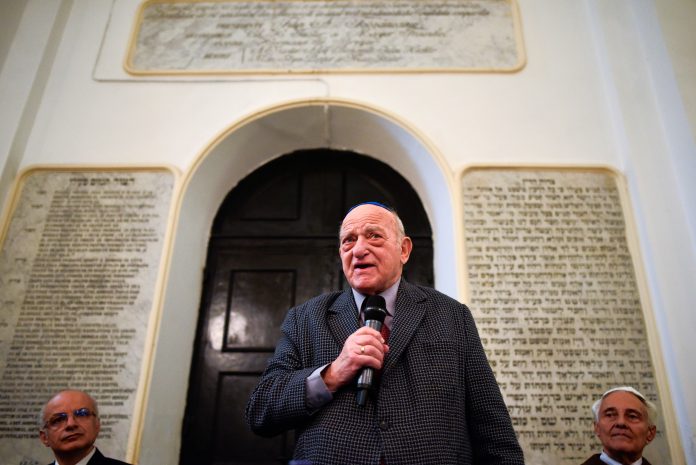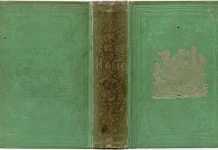Aurel Vainer, who survived the Holocaust in Romania where hundreds of thousands perished, raised public awareness about anti-Semitism, and led the country’s dwindling Jewish community until less than a year ago has died. He was 89.
Mr Vainer died at the Military Hospital in Bucharest on Sunday, the Federation of the Jewish Communities of Romania said.
Jewish architectural monuments
He stepped down as chairman of the organization in November 2020 to make way for a younger leader.
As its leader he oversaw the restoration with the help of international Jewish organizations and the Romanian state of a number of Jewish architectural monuments.
David Saranga, Israeli Ambassador to Romania, called him: “an extraordinary leader who made unremitting efforts to protect the Romanian Jewish community and to shed light on its history. … We will always cherish his tireless work in the service of the Jewish community, his close relationship with Israel.”
Before World War II, 800,000 Jews lived in Romania. Hundreds of thousands died in the Holocaust and thousands emigrated during the communist years. There are just a few thousand today.
Alexandru Muraru, adviser to the prime minister on anti-Semitism issues, said Mr Vainer was important for both Jews and Romanians.
Holocaust memory
“He contributed essentially to the introduction of the Holocaust memory to the Romanian public agenda,” he told G4Media.
Between 280,000-380,000 Jews were killed on Romanian-held territory during World War II, according to official figures.
Aurel Vainer was born in 1932 in Stefanesti in northeast Romania. One of his early memories is of a commando representing the state and the “legionnaire” anti-Semitic movement, which was then in government, telling his father that all his property was to be confiscated simply because he was a Jew.
When World War II ended he joined a leftist youth Zionist movement, and moved to a kibbutz near the Black Sea port of Constanta, anticipating his emigration to Israel.
Communist authorities
But, when the ship that was to take them to Palestine arrived, members of the Communist-aligned Jewish Democratic Committee boarded it instead and there was no room for him and his comrades.
Shortly afterwards, Communist authorities banned emigration, and he never managed to settle in Israel.
“I accepted my destiny,” said Vainer, who has instead devoted his life to the “missions” he’s been given as a diaspora Jew.
Jewish minority
In 1990 after communism ended, he became vice president of Romania’s Chamber of Commerce. He was elected a lawmaker to represent the Jewish minority in 2004, one of 17 seats allocated for national minorities. .
As lawmaker, he helped write laws that protected the victims of the Holocaust and outlawed discrimination on ethnic and religious grounds and banned the use of Nazi symbols, Mr Muraru said.
Beyond that, he prided himself for promoting “understanding and inter-human relations … and not put up barriers or immediately raised criticisms,” Mr Vainer told Balkan Insight last year.
Synagogues and cemeteries
He said he had excellent relations with all his colleagues during his three terms in parliament, which enabled the renovation of synagogues and Jewish cemeteries.
His aim was to “show that Jews have been here and left positive things behind; not war citadels but synagogues, cemeteries, things that show certain human quality,” he told the publication.
“Life is complex,”he said in the interview, examining Romania’s history. In January 2019, there was an even at Bucharest’s Great Synagogue to marking the anniversary of the 1941 pogrom. The U.S. and Russian ambassadors rowed about their countries’ roles in World War II.
Americans
He added his voice to the discussion, recalling the mood among Romanian Jews at the time. He said that Romanians, including Jews, waited in vain for almost four decades for the Americans to come and free them from Communism.
During World War II, the Romanian Jews longed for the Soviet Union to liberate the country from the fascist yoke that sent tens of thousands of Romanian Jews to their death during the Holocaust.
Unlike the Americans, the Russians did eventually come, honoring a line in Yiddish that was popular among Jews during his childhood: “Foaie verde, grüne bleter, adabolt kimt der Feter”. It derives from Romanian folk song Foaie verde (green leaf) and translates as, “Green leaf, green frond, here comes the [Soviet] Uncle.”
Soviets
“It was our hope – and this circulated in the Jewish world,” Vainer remembers. “Our situation changed radically for the better (when the Soviets arrived). It meant life to us. That they would later abolish democracy is another story, but we can’t deny historical truth,” he told Balkan Insight.
Romania’s PM remembers his country’s role in Holocaust; warns about rise of extremist party



















